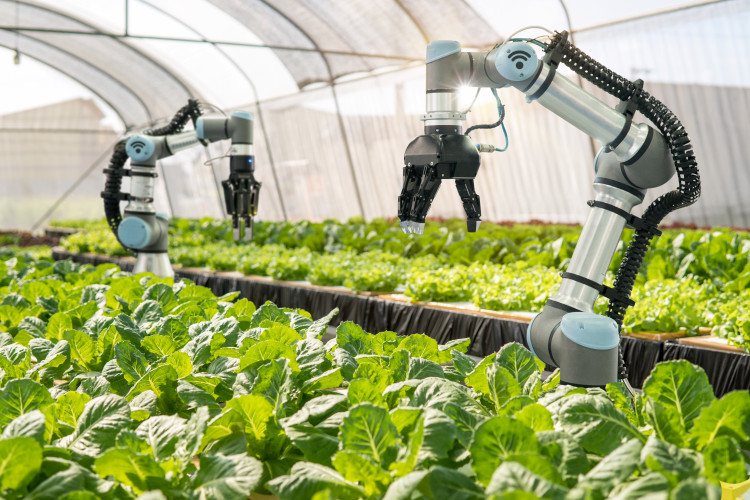The Rise of the Machines: How Automation is Reshaping Agriculture
We are eager to share insights into the engaging theme concerning The Rise of the Machines: How Automation is Reshaping Agriculture. Our goal is to provide fascinating information and deliver a fresh outlook.
Video about The Rise of the Machines: How Automation is Reshaping Agriculture
The Rise of the Machines: How Automation is Reshaping Agriculture

The image of a farmer toiling in the sun, their hands stained with earth, is deeply embedded in our cultural consciousness. Yet, the realities of modern agriculture are rapidly evolving, driven by the relentless march of technology. Nowhere is this transformation more evident than in the growing adoption of farm automation systems.
Gone are the days when farm work was solely manual. Today, sophisticated machinery and intelligent software are transforming fields into high-tech environments, streamlining tasks, boosting efficiency, and tackling some of the industry’s biggest challenges.
Unveiling the Benefits: Why Automate?
The allure of automation for farmers is multifaceted:
- Increased Efficiency & Productivity: Imagine a world where planting, harvesting, weeding, and even milking cows happens with minimal human intervention. Automating these laborious tasks frees up valuable time and resources, allowing farmers to manage larger plots of land and boost overall output.
- Reduced Labor Costs: The agricultural sector is facing a critical labor shortage globally. Automation can help bridge this gap by performing repetitive tasks with precision and consistency, reducing reliance on seasonal or temporary workers.
- Enhanced Crop Quality & Yield: Automated systems can monitor environmental data, soil conditions, and plant health in real-time. This allows for precise application of fertilizers, pesticides, and irrigation, leading to healthier crops and improved yields.
- Minimized Environmental Impact: Smart irrigation systems, precise fertilizer application, and optimized machinery usage all contribute to reduced resource consumption and minimized environmental footprint. Automation can play a crucial role in sustainable farming practices.
- Data-Driven Decision Making: Modern farm automation systems generate a wealth of data on everything from soil moisture to crop growth patterns. This data can be analyzed to identify trends, optimize processes, and make informed decisions for future seasons.
The Landscape of Farm Automation: A Look at the Technologies
The world of farm automation is brimming with diverse technologies, each addressing specific needs and challenges:
- Robotics: From autonomous tractors that plow and sow to robotic harvesters that pluck ripe fruits, robots are taking on increasingly complex tasks in the field.
- Drones & Aerial Imaging: Drones equipped with high-resolution cameras and sensors provide valuable aerial views of crops, detecting diseases, pests, and irrigation needs.
- Precision Agriculture: This data-driven approach relies on sensors, GPS, and software to collect and analyze farm-specific data, enabling farmers to make precise decisions about resource allocation and management.
- Automated Irrigation Systems: Smart irrigation systems adjust water application based on real-time soil moisture levels, weather forecasts, and crop requirements, conserving water and improving irrigation efficiency.
- Vertical Farming: This innovative approach utilizes vertical structures and controlled environments to grow crops in layers, significantly minimizing land requirements and optimizing resource usage.
Overcoming Challenges & Embracing the Future
Despite the undeniable benefits, the widespread adoption of farm automation faces several challenges:
- High Initial Investment Costs: Implementing automated systems can require significant upfront capital expenditure, which may be prohibitive for smaller farms.
- Technological Expertise & Training: Operating and maintaining sophisticated automated systems requires specialized skills and training, which may not be readily available in all farming communities.
- Data Security & Privacy Concerns: The vast amount of data collected by farm automation systems raises concerns about security breaches and the ethical use of sensitive agricultural information.
- Job Displacement: Automation may lead to concerns about job losses in the agricultural workforce, requiring careful planning and strategies for reskilling and retraining.
However, the future of farm automation remains bright. Ongoing advancements in artificial intelligence (AI), machine learning, and sensor technology are continuously pushing the boundaries of what’s possible.
Closure
Thus, we hope this article has offered insights into The Rise of the Machines: How Automation is Reshaping Agriculture. We hope you found this information helpful and enriching. Stay tuned for our next article!.

No comments:
Post a Comment